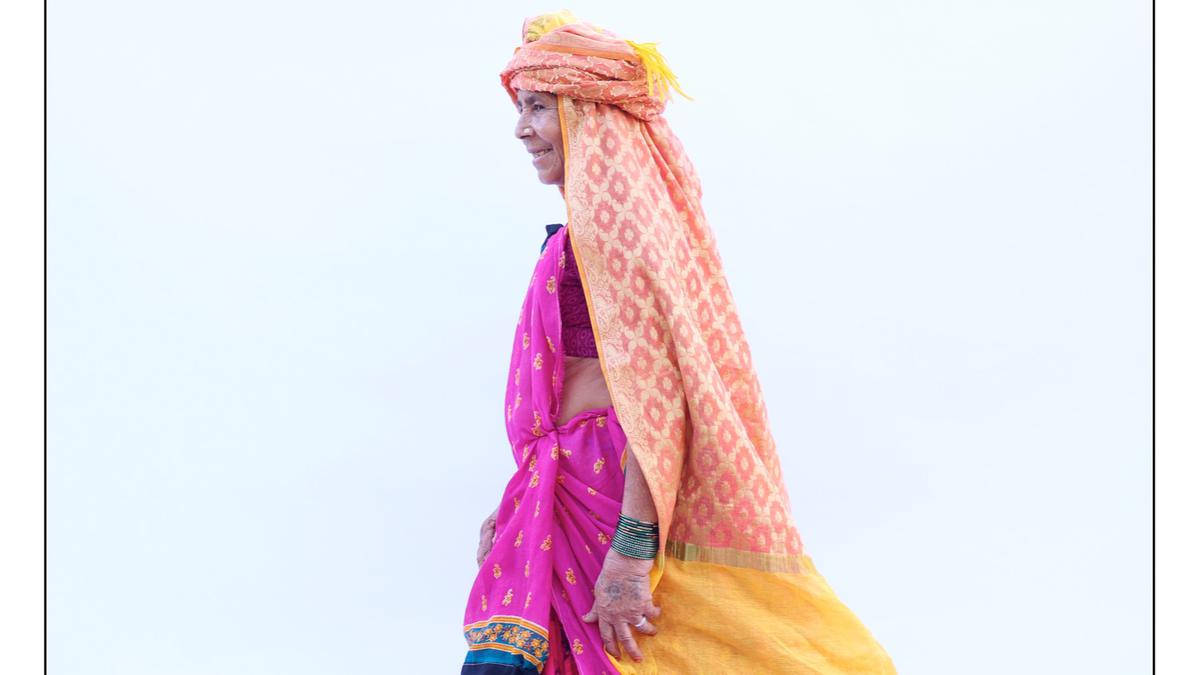
Picture shot by Telangana girl makes it to Vogue Italia magazine
The Hindu
The image of a traditionally dressed grandmother on her way to a wedding lunch clicked by a student of Telangana Tribal Welfare Fine Arts Academy (TTWFAA) has made it to the Vogue Italia magazine.
The image of a traditionally dressed grandmother on her way to a wedding lunch clicked by a student of Telangana Tribal Welfare Fine Arts Academy (TTWFAA) has made it to the Vogue Italia magazine.
The student, Mamatha Gugoloth, who is pursuing a BA (honours) course at the TTWFAA in Sircilla said, “That is my paternal grandmother Kesli who was on way to a wedding lunch in our Banjepally thanda in Kamareddy district. I shot the image in daylight without a tripod.”
On July 5, Telangana IT Minister K. T. Rama Rao shared the image of the woman dressed in a colourful outfit wearing a faint smile. Mr. Rao also complemented Mamatha and her teachers at the institution.
“I gained interest in photography when I was in Class IX. Back then my teachers used to ask me to click their photographs. That’s why I chose the photography course. I want to either pursue wedding photography of fashion photography,” said Mamatha whose father is a farmer.
The photographs were shot for an exhibition to be hosted at Ravindra Bharathi in Hyderabad as part of the 10th year celebration of Telangana formation.
“This image and others were shot for the exhibition. I decided we should go out and shoot in natural surroundings instead of a studio. We went to nearby villages and thandas where the students photographed the people they knew,” said Raghu Thomas, the photography teacher and mentor at TTWFAA.
Mr. Thomas, who has earlier worked in Mumbai after finishing his studies in JNFAU had earlier contributed to Vogue Italia and decided to share Mamatha’s work with due credit.

“Writing, in general, is a very solitary process,” says Yauvanika Chopra, Associate Director at The New India Foundation (NIF), which, earlier this year, announced the 12th edition of its NIF Book Fellowships for research and scholarship about Indian history after Independence. While authors, in general, are built for it, it can still get very lonely, says Chopra, pointing out that the fellowship’s community support is as valuable as the monetary benefits it offers. “There is a solid community of NIF fellows, trustees, language experts, jury members, all of whom are incredibly competent,” she says. “They really help make authors feel supported from manuscript to publication, so you never feel like you’re struggling through isolation.”

Several principals of government and private schools in Delhi on Tuesday said the Directorate of Education (DoE) circular from a day earlier, directing schools to conduct classes in ‘hybrid’ mode, had caused confusion regarding day-to-day operations as they did not know how many students would return to school from Wednesday and how would teachers instruct in two modes — online and in person — at once. The DoE circular on Monday had also stated that the option to “exercise online mode of education, wherever available, shall vest with the students and their guardians”. Several schoolteachers also expressed confusion regarding the DoE order. A government schoolteacher said he was unsure of how to cope with the resumption of physical classes, given that the order directing government offices to ensure that 50% of the employees work from home is still in place. On Monday, the Commission for Air Quality Management in the National Capital Region and Adjoining Areas (CAQM) had, on the orders of the Supreme Court, directed schools in Delhi-NCR to shift classes to the hybrid mode, following which the DoE had issued the circular. The court had urged the Centre’s pollution watchdog to consider restarting physical classes due to many students missing out on the mid-day meals and lacking the necessary means to attend classes online. The CAQM had, on November 20, asked schools in Delhi-NCR to shift to the online mode of teaching.









